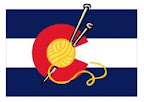 When I started my blog, I sought out wisdom about it. My background is in marketing research and art. I am always asking questions to the point my friends even say to me: "Boy, you ask alot of questions and read everything, don't you?" I thought, prayed and meditated where I desired this blog to go. I decidedly began by placing pictures of my work and listing all the things one may want to know about it, type of yarn, medium, tools, etc. not really desiring to expose my thoughts and actions mind rejection. I also read other blogs to see what they were doing and thus, taking ideas and shaping them into what I thought others and myself would like. I prayed that it would be creative and inspirational. This idea about a web log = blog and being able to journal was not a thing I was really interested in. I much prefer doing than thinking and writing about it. But I have found myself desiring it more after reading about others lives in general and not so general, with inspiration and musings of their physical and mental labors all in the under the umbrella of creativity. I am thinking this can be a vehicle for inspiring creativity and originality.
When I started my blog, I sought out wisdom about it. My background is in marketing research and art. I am always asking questions to the point my friends even say to me: "Boy, you ask alot of questions and read everything, don't you?" I thought, prayed and meditated where I desired this blog to go. I decidedly began by placing pictures of my work and listing all the things one may want to know about it, type of yarn, medium, tools, etc. not really desiring to expose my thoughts and actions mind rejection. I also read other blogs to see what they were doing and thus, taking ideas and shaping them into what I thought others and myself would like. I prayed that it would be creative and inspirational. This idea about a web log = blog and being able to journal was not a thing I was really interested in. I much prefer doing than thinking and writing about it. But I have found myself desiring it more after reading about others lives in general and not so general, with inspiration and musings of their physical and mental labors all in the under the umbrella of creativity. I am thinking this can be a vehicle for inspiring creativity and originality.This has lead me to wonder about where originality comes from, learning it is from creativity and creativity rises from new ideas or concepts. Finding new ideas and concepts are images existing or formed in the mind. Phew! This is working me.
Now, this gets serious....is originality something new if it is an image existing or formed...formed out of what and that is where inspiration comes into play. Literally the word inspiration means "breathed apon". Well then who's doing the breathing here? This takes us into the ritualistic and divine origins of the breath of god. What is the breath of God? I look to wikipedia again searching for the breath of God and it lead me to the Holy Spirit and I find this nugget: The Spirit's action in one's life is believed to produce positive results, known as the Fruit of the Spirit. The Holy Spirit manifests these gifts by enabling a person to access his or her own innate abilities. Through the influence of the Holy Spirit a person sees more clearly the world around him or her and can use his or her mind and body in ways that exceed his or her previous capacity. Wow, I am wondering exactly how does one get this Holy Spirit to manifest in one's life and conclude with this:
Colossians 1:27 To them God has chosen to make known among the Gentiles the glorious riches of this mystery, which is Christ in you, the hope of glory
I had an art teacher tell me, "nothing is original, in fact, art of any form is all copies of others works or ideas(paraphrased)." At one time or another I believe we have all thought about this subject. I am believing originality is more, that it is spiritual and not of tradition. So where do you think originality comes from?
References from Wiki(not the most reliable but convienent):
Inspiration in artistic composition refers to an irrational and unconscious burst of creativity. Literally, the word means "breathed upon," and it has its origins in both Hellenism[disambiguation needed] and Hebraism in the west. In the earliest discussions of inspiration (in the works of Homer and Hesiod), the ritualistic and divine origins of the breath of a god are important.
An idea (Greek: ἰδέα, from eidon: I saw) is an image existing or formed in the mind.
muse In Greek mythology, the Muses (Greek Μοῦσαι, Mousai: from the Proto-Indo-European root *men- "think", from which mind and mental are also derived[1])
Creativity (or creativeness) is a mental process involving the generation of new ideas or concepts, or new associations between existing ideas or concepts. From a scientific point of view, the products of creative thought (sometimes referred to as divergent thought) are usually considered to have both originality and appropriateness. An alternative, more everyday conception of creativity is that it is simply the act of making something new. Although intuitively a simple phenomenon, it is in fact quite complex. It has been studied from the perspectives of behavioural psychology, social psychology, psychometrics, cognitive science, artificial intelligence, philosophy, history, economics, design research, business, and management, among others. The studies have covered everyday creativity, exceptional creativity and even artificial creativity. Unlike many phenomena in science, there is no single, authoritative perspective or definition of creativity. Unlike many phenomena in psychology, there is no standardized measurement technique.
Creativity has been attributed variously to divine intervention, cognitive processes, the social environment, personality traits, and chance ("accident," "serendipity"). It has been associated with genius, mental illness and humour. Some say it is a trait we are born with; others say it can be taught with the application of simple techniques. Although popularly associated with art and literature, it is also an essential part of innovation and invention and is important in professions such as business, economics, architecture, industrial design, science and engineering.
Despite, or perhaps because of, the ambiguity and multi-dimensional nature of creativity, entire industries have been spawned from the pursuit of creative ideas and the development of creativity techniques. This mysterious phenomenon, though undeniably important and constantly visible, seems to lie tantalizingly beyond the grasp of scientific investigation.
Originality is the aspect of created or invented works as being new or novel, and thus can be distinguished from reproductions, clones, forgeries, or derivative works. An original work is one not received from others nor one copied based on the work of others. The term "originality" is often applied as a compliment to the creativity of artists, writers, and thinkers."Creativity, it has been said, consists largely of re-arranging what we know in order to find out what we do not know." George Kneller












No comments:
Post a Comment